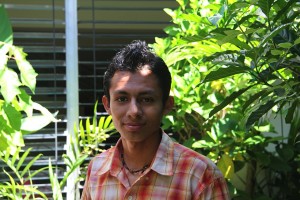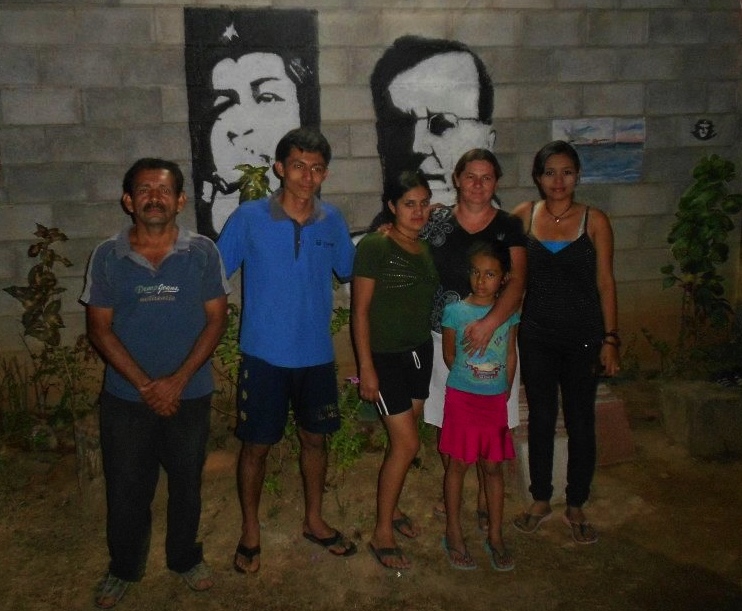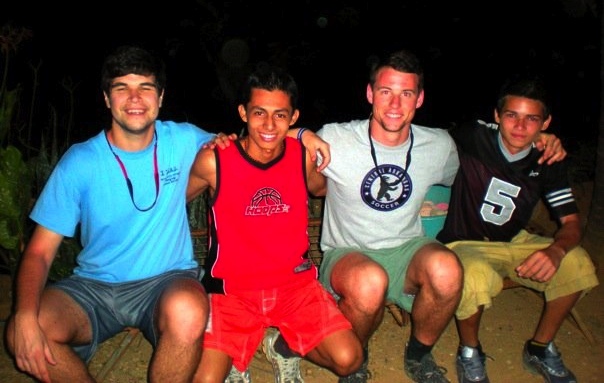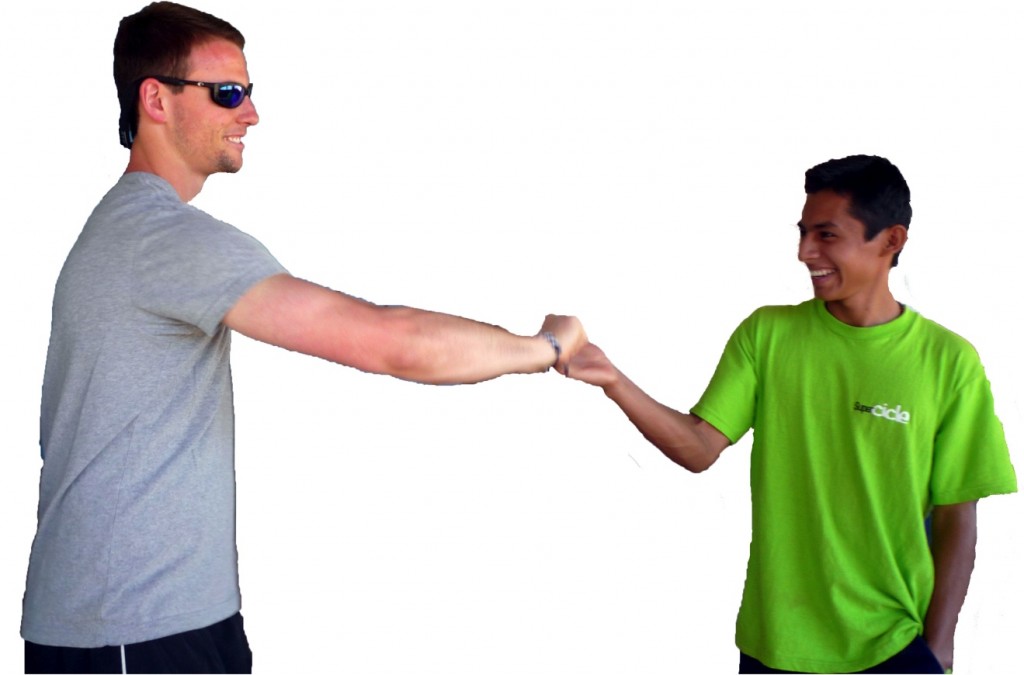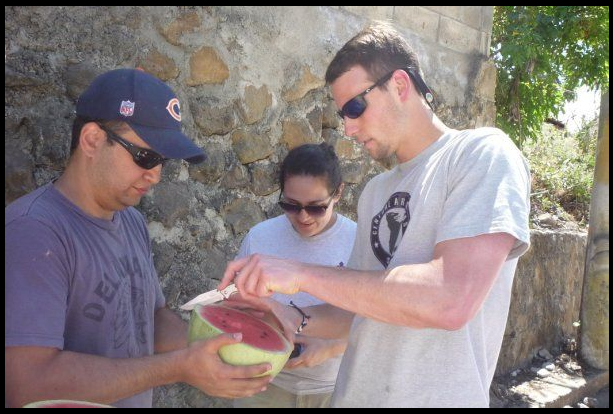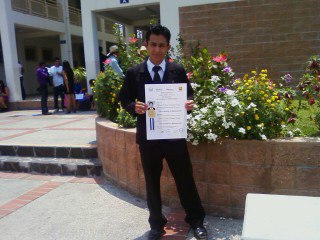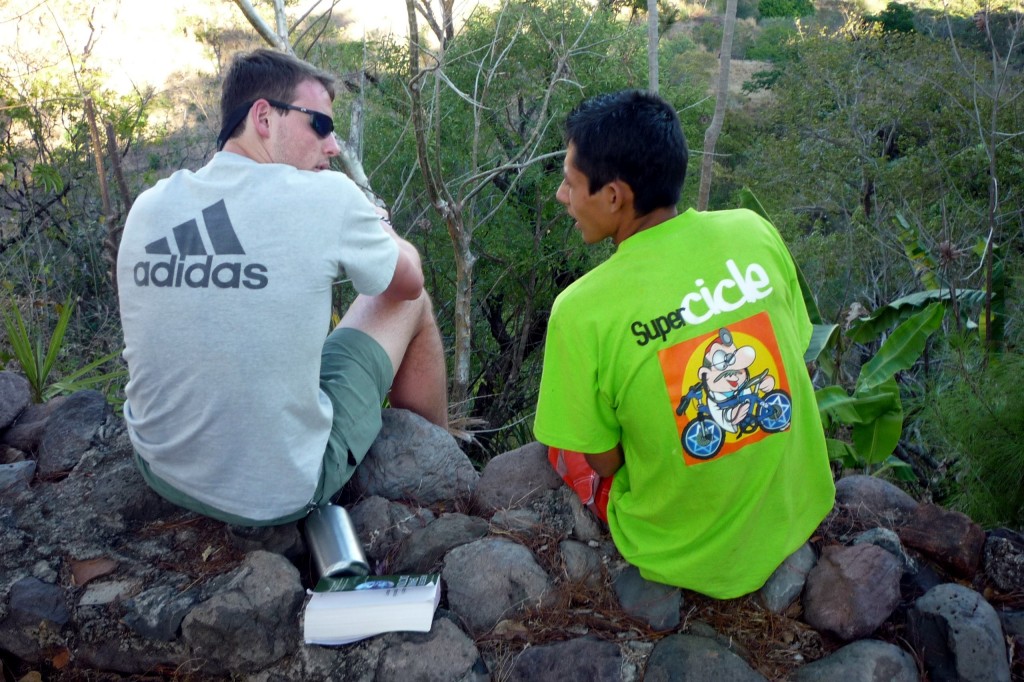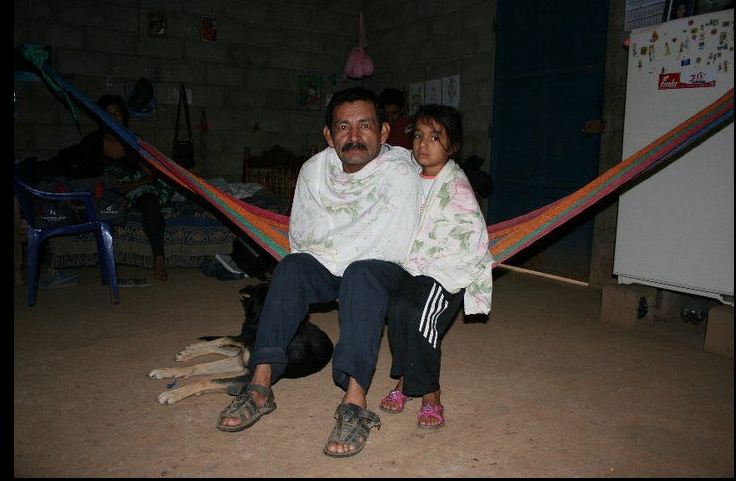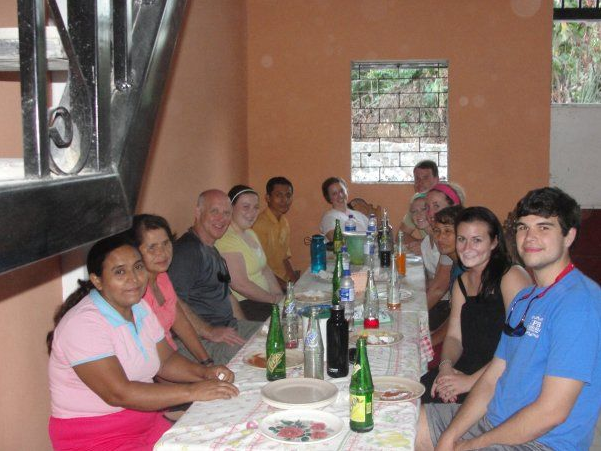STORY OF MARIO ROBERTO VASQUEZ LOPEZ
With enriching contributions by Michael Lysek and Cory Bronenkamp,
Former students at Spring Hill College, Mobile, Alabama
And a special thanks to Lindsay Hughes, the college’s Associate Director of Communications and Marketing, who facilitated these contacts and shared photos
Editor’s Note: The executive director of CRISPAZ, Francisco Ugarte, suggested we interview Mario. We knew nothing about him before sitting down together other than the brief synopsis Francisco shared. His story continued to unfold and develop for months afterwards.
Cory was class president when he, Michael, and others joined Francisco Ugarte’s CRISPAZ immersion trip in El Salvador for a week in March, 2010. As a result of their positive experiences and specifically being touched by Mario whom they met, they collectively formed a non-profit organization (International Organization for Youth Education) which provided a scholarship to Mario, its first recipient.
We interviewed both Michael and Cory, who helped put Mario on a road to future sustainable income. They provided further insight and details about Mario’s life.
In addition, it is refreshing to hear the two of them passionately share how the impact of this immersion trip and their creative follow-up motivates their personal long-term goals and plans.
MY BACKGROUND – BY MARIO
“The youth is the future of the country. If we focus on the youth, it will help the country as a whole.”
When I was in the 9th grade, I learned to say, “My name is Mario” in English. After high school I thought I would like to be able to speak English with one “gringo,” so I got a Spanish-English dictionary and spent weekends practicing words in front of a mirror. [Mario today is speaking in somewhat broken English but is certainly able to engage in dialogue with us during this interview.]
I am the oldest of four children, the only boy, in my family who lives in Guarjila, a town in Chalatenango department on the Honduras border of El Salvador. Guarjila is one of the safest municipalities. [This area was heavily impacted by fighting resulting in civilian violence during the country’s civil war.]
My dad rents a small parcel of land where he farms beans and corn. He is 54 years old and probably will be able to continue farming only another five years. My 38-year-old mom works in the home. My 17-year-old sister helps her do chores. My little sister is six years old.
Our 19-year-old sister made the decision to go to the U.S. to try to earn money to send back to help support our parents. We were hurt by this decision and knew she could die along the way in the desert. However, she was young and strong, and I could not say, “You cannot go, but only, God willing, go safely and I will support your decision.” She paid $7,000 which was divided up among a series of “coyotes” leading her group traveling on foot by land. There were some complications on this arduous journey, and they had to remain awake to be vigilant. They were left in Mexico, caught in the U.S., sent back, and returned a second time. She was determined to make the trip. Perhaps someday my sister will return to help care for my mother when she gets older.
I am undecided about making that same choice of going to the U.S. I would prefer to go legally with a visa to visit. If I went there to work, I know I could earn more money than I could here and one day return to build a little house and help my father. I am also very aware that jobs are hard to get in the U.S.
I am twenty-one, my birthday is January 10, 1991. I help my dad farm part-time as well as work in a carpentry shop. Sometimes I sell some pieces that I make. For fun I enjoy playing soccer. I liked school and graduated from high school where I enjoyed math and construction. I wasn’t able to afford to continue my education beyond high school. In the spring of 2010 I met students from a college in the U.S. Michael and Cory were two of the guys who spent time with me.
MY BACKGROUND – BY MICHAEL
“My passion for doing international work has always been strong, but spending time with Mario and his family and seeing how grateful they were for our efforts to help him solidified this.”
MICHAEL IS ON THE LEFT WEARING THE BLUE SHIRT
As a young child I always had a desire to travel but had limited opportunities to do so. My dad is an electrician, and my mom is an insurance agent. They both model volunteering along with my aunt and uncle. It was natural that I would also enjoy volunteer work. The desire to travel and volunteering got mixed together, and attending Spring Hill College helped me mesh them well.
My love of the Hispanic culture has always been evident. One of my mentors, an orthopedic surgeon in the area I am from, is a Cuban whose family fled the Castro regime.
Also, I dated a Cuban girl from Miami for a couple of years, which gave me a new perspective of the culture as a whole. Learning about, and seeing the struggles faced by people in these countries made my desire continually increase. My passion for the Hispanic culture has grown, and ultimately I would like to practice medicine in Miami and Latin America someday.
As part of its Jesuit roots, Spring Hill College in Mobile, Alabama, has a long-standing tradition of providing immersion trips to its students at a low cost. I was fortunate enough to go on three trips—Belize, Nicaragua, and El Salvador. The way they work is you rate the ones you want first to last and you are chosen by the leaders of Campus Ministry. The college has a strong commitment with CRISPAZ’s immersion trips because of the Jesuit connection. The CRISPAZ trip to El Salvador is particularly well received because its focus is to educate you on the reality of the Salvadoran people. We met many people representing its social and political sectors and got to spend time with families in Guarjila, Chalatenango, for a few days. That is where I met Mario.
MY BACKGROUND – BY CORY
“It just seemed like God put us there in Guarjila for a reason and I can’t think of any other time during the trip that we were moved so greatly as our time with Mario.”
As a student at Spring Hill, a Jesuit college, I was an English major with minors in Spanish and theology. I hold a masters of liberal arts degree in leadership and ethics from there also.
The prime educational objective underlying Jesuit education is “to form men and women for others.” That philosophy has become embedded deeply within me as I combine it with my love of travel and experiencing new cultures.
Spring Hill offers many opportunities to take immersion trips. I actually took four during my undergrad years: freshman year I traveled to Nicaragua, sophomore year to the Dominican Republic, junior year to El Salvador, and senior year to Ecuador.
I’ve been interested in Latin America for a long time. In high school I visited Honduras which sparked my interest in that region. My 10 years of Jesuit training has been ingrained in social justice, and El Salvador is embedded with a social justice and injustices theme. The injustices in Latin America are much different than the injustices in the U.S.
The El Salvador trip was one of the better trips in terms of learning about the culture and developing kinship with the people. It is structured in such a way to highlight the country’s history, its struggles, and meeting people. A portion of the trip is spending time in a community with Salvadoran families which allowed us to connect with them.
CRISPAZ’S NOW EXECUTIVE DIRECTOR, FRANCISCO UGARTE,
WHO LED THE DELEGATION STEADIES THE WATERMELON
Sometimes immersion trips can be a little selfish. You may go build a house and return with a sense of completion. This trip allowed us to experience the realities of the people and then decide for ourselves how to act on those experiences after time of reflection.
My first impression in stepping into a Mario’s home was not its starkness, but the warmth of his family. I was amazed how open they were. It was their calm, happy, unashamed, welcoming attitude that spoke to me more than the dirt floor, 16’x20’single open space of the cinder block structure. Mario and I established a kinship immediately.
THE STORY OF THE SCHOLARSHIP AND ITS AFFECT ON ME – BY MICHAEL
While attending the Ignatius Spirituality Retreat in 2013, I began to realize when things keep popping up over and over in my mind, that is the way God is telling me I need to be doing something. This is exactly what was happening on the immersion trip to El Salvador in 2010 when I met Mario. I recognized his potential immediately. I continually said, “Cory, we have to do something.” The wheels were beginning to spin in my head. This eventually took shape in the form of a non-profit we called IOYE – International Organization for Youth Education.
When I got home from the immersion trip, I had this overwhelming feeling that I needed to return. Cory was experiencing the same feeling, and we contacted Francisco about some of our ideas for Mario that were percolating. Our immersion trip was in March, 2010. Cory and I returned to El Salvador two months later, in May.
There was something special about this young guy who was self-motivated to teach himself English even though he was struggling to speak it. We recognized that Mario had many talents and felt he deserved to be given opportunities to use them. We saw an education as a good sustainable way for Mario to get out of his poverty.
My parents were reluctantly supportive. [He laughs.] Well . . . they paid for the trip, but they were concerned about the safety aspect. Cory and I wanted to spend concentrated quality time with Mario and his family. I spent one week alone living with Mario and his family, and Cory and I spent another month in the country working out the details for the scholarship idea for Mario.
The time I spent when I was with Mario’s family was following their routine. The men went to work in the fields which at that time involved spraying/fertilizing the corn. The women cooked. I helped in both cooking and working because I truly wanted to understand and learn everything about how these people lived. Mario worked part-time in the carpentry shop. He also paints as a hobby and has painted murals on the side of his house. [Interesting that Mario neglected to mention any of this to us during our interview.]
The plan Cory and I had before going there was not the same plan we ended up presenting to Mario. We had a general idea for it, but had many details to work out during that trip. We had to make decisions based on the best option for Mario given the information we discovered as a result of networking with key people. We learned the realities and complexities of the situation once we arrived.
Mario is soon ready to graduate from a two-year program toward civil engineering. (There are also 4 and 5 -year programs at other schools.) The technical school which is one of the country’s ITCA campuses boasts an 80% job placement rate. Mario did classroom work for the first year and a half. During the last six months Mario is serving an internship or a co-op program where he gets paid. He is an apprentice with the road department which is partially funded by the government and partially funded by business. Within a year he should move up within his current job.
Keeping in touch with Mario by Facebook is easy. Anytime I am in El Salvador I would like to visit Mario and his family. I had wanted to attend his graduation, but the timing just won’t work out for me to be able to get away for a mid-April graduation.
I have not heard him say anything about wanting to come here to the U.S. I disagree with his thinking he should come here to work. I think he should give his job a chance. He should be in line for future promotions, and this job should provide adequately for his family.
MARIO PROUDLY DISPLAYS HIS DIPLOMA
My passion for doing international work has always been strong, but spending time with Mario and his family and seeing how grateful they were for our efforts to help him continued to solidify this for me. He had no money other than the little he earned selling his crafts. I wanted a better life for him.
My desire has not shifted; my priorities have shifted. Two years ago I was able to devote my energies to organizing a non-profit for the scholarship. That was something I could do at that time. There’s a quote in Three Cups of Tea by Greg Mortenson on p. 201 “One had to water a plant before it could be coaxed to grow. Children had to survive long enough to benefit from school.” That stuck with me regarding educational opportunities for helping Mario because it couples my past priority with my new priority. Attending an MD/MDH program has shifted my priorities toward a health-related cause. I would like to alleviate the health care delivery problems our country and other countries face. This is my next direction and I hope to truly instill a collaborative and sustainable solution to healthcare around the world.
First, let me say that I am again experiencing that same overwhelming feeling I had prior to returning to El Salvador. To me this is God telling me it is the time for me to act. Since 4th grade I’ve expressed interest in wanting to be a doctor. (In fact some people have told me I mentioned it before that point.) Now that I am finishing undergrad school and have been working in a hospital the past year, I have that opportunity by starting medical school very soon. Health care now becomes my focus. Most medical schools do not require a thesis but the one I will be attending does. I already know that I will be doing mine on an international medical business model that can be implemented in the United States and abroad. It will be done with a group of other physicians across the country. I hope to help those indigent people across the world without access to care.
When I was in Guarjila, I observed the doctor who visited the village briefly and then was on to practice in the next ten other villages. At some point in my career after my hundreds of thousands of medical school loans are paid off, I could see myself doing volunteer work domestically and in El Salvador or another Latin American country. On of my mentors in Miami, Dr. Pedro Greer, who has won the Presidential Medal of Honor, goes into the streets of Miami serving the homeless. While he maintains his own practice, he also devotes a certain number of days per week in a free clinic setting. Another one of my mentors in Fairhope, Dr. Paul Fellers, an orthopaedic surgeon, works in Ecuador half the year and in the United States half the year correcting bone deformities that many of the people in Ecuador face. Dr. Fellers even took a year off to work in Kenya upon finishing his residency which is also an option for me in Latin America. I have come to realize that it is a matter of efficient time management and priorities for me to achieve my goals in medicine. I deeply admire these and many other physicians and want to try to emulate their commitments in medicine while adding my own expertise to the mix. I can see myself doing volunteer medical work in Latin America, and impoverished areas of this country. I love El Salvador and would love to live there at some point in my life because it is like a second home to me, but I am open to where God leads me as long as I am helping those who are most in need.
THE STORY OF THE SCHOLARSHIP AND ITS AFFECT ON ME – BY CORY
During our group’s two days in Guarjila, we got to know Mario Vazquez. He motivated us and touched our hearts to want to provide some form of education that would position him to succeed beyond working on the farm in Guarjila. We wanted to break the unending cycle of poverty for him.
MARIO’S, NOW WELL WORN DICTIONARY, REST ON THE STONES AS HE CONVERSES IN EXCELLENT ENGLISH
There were several things about Mario that stood out to us. For one thing we were about the same age. We had spent a lot of time together in a rural area without distractions and really got to know one another well. Michael actually lived with him during the second trip. I did not. We had invested time into forming a relationship with him.
Mario had been an intelligent student in high school but had no financial resources to continue his education when he graduated. We knew he was intelligent by the fact he was self-taught in English. By using only a dictionary, he was somewhat fluent to us native speakers. His work ethic was very good. He would get up early in the morning and go to the local workshop to learn. It showed us that he wanted to succeed with what he was given. When you looked at the reality in which he lived and observed all of these positive personal traits he had, it drove us to want to do something for him.
It just seemed like God put us there in Guarjila for a reason, and I can’t think of any other time during the trip that we were moved so greatly as our time with Mario.
Mario was our inspiration for returning to El Salvador a second time. We wanted to explore how we could send him to college or higher education. Our second trip was a fact-finding trip. We spent a great deal of time in San Salvador talking to anyone we could even remotely consider who might be able to help us.
Originally we were thinking in terms of his going to the UCA, since we are also a Jesuit school, but we ruled that out rather quickly for various reasons. We had to look at the realities in terms of programming and employment opportunities after graduation, location, transportation, housing, and cost.
One of the things we found out when we were first leaning toward a five- year university was that in this regimented educational system, if a student fails one course freshman year, he must repeat the entire year. The time and money would be gone. Mario had skills in math. However, we were also warned that there was an overflow in the job market of business people such as accountants. At this point our focus changed away from five-year university programming.
Our sources said what the country really needed was students going into the trades, so we started looking at trade schools at Institute of Technology in Central America. These schools were welcoming us with open arms which we were not getting at other institutions. The price was substantially cheaper, and students were receiving real life skills with high job placement ratings. There were numerous campuses including one near Mario’s home.
We chose the school that was closest to his home so that he could commute. We knew he was always interested in engineering. He chose their two-year civil engineering program with the guaranteed job at the end and chances for regular promotions. This will allow him to be self-reliant in terms of a source of income.
Stipulations in the contract for keeping his scholarship include Mario’s maintaining a certain GPA. He must give back to the community in some way. The church work he is doing may be part of that. We asked that he avoid the use of drugs and alcohol, although we have no way to monitor that. Basically the reason for these conditions is we want to emphasize that the student take ownership of his education and accept responsibilities such as registering for his classes and paying his own tuition. We want to empower him without it appearing like a handout. We want to hold him accountable which will prepare him for the responsibilities of a job. Mario has always been appreciative and continues sending letters thanking us for our help. This family is the best case scenario and a good success story to build the program on.
Being a politically conservative person, I am always cautious about simply giving things away. I fear the entitlement mentality which we tried very hard to steer away from in our case. In Mario’s case, having spent time with the family, it never came across from his family or him that it would be abused. We had established a firm level of trust. It goes back to the old Chinese proverb: “Give a man a fish, feed him for a day. Teach a man to fish, feed him for a lifetime.” By providing an education, we are empowering these kids to break that cycle of poverty and make it on their own.
Like Michael, I have been doing the eight-week St. Ignacius spiritual discernment, and the question of how to continue to maintain contact with Mario is one I have been pondering. It would be tough for me to graduate Mario and to close the book on him. El Salvador has a special interest in my heart based on my experiences and hearing the history and struggles. I would like to do more than simply maintain Facebook contact with Mario and his family, with Guarjila, and with Francisco. I had hoped to attend Mario’s graduation, but this time of year is impossible for my schedule.
My plan is to regularly follow-up to see what an impact the educational component has on Mario and his family. I would also like to observe him in action serving within his community.
On the initial immersion trip we all laughed at a comment from Sister Peggy of Suchitoto, “El Salvador is like getting herpes. Once it’s in you, it doesn’t leave.” There is a certain element of truth to that. It is going to be difficult to be at a different level of involvement from this juncture on.
THE STORY OF THE SCHOLARSHIP – BY MARIO
Three years ago two students from Spring Hill College, Michael Lysek and Cory Bronenkamp visited Guarjila, and we got to know one another. They returned a few months later, Michael lived in my house and shared time together and details about my life. They wanted to help people here. This is not a developed country, and they saw I had no opportunity.
I was awarded a scholarship by them and am now in a better position to achieve my goals of helping my family. If it weren’t for their scholarship, I would continue on the same path of farming and carpentry. When I learned about this opportunity, I was excited and happy. I can work here and help my family.
My dad supports my studying because he realizes farming is only for survival; however, if I study, I can have a better life. I look up to my dad who inspires me to keep looking forward. He tells me, “If you can better your life, go, work hard. I want you to do a lot in your life. I want you to be an exemplary person.”
My dad was a guerrilla fighter in Guarjila during the 12-year civil war and shared his adventures with me. This may also motivate his wanting me to get an education to find opportunities for a future beyond the farm.
MARIO’S DAD AND YOUNGER SISTER
My sisters and I want to be able to help our parents. Personally I want to be able to help my little sister when she is older. Secondly, God willing, I hope I can have success in the future. Whenever I do anything I put my trust in God that He will help me make the right decisions.
My mother took me to church when I was young. Now I help the Oblate sisters run the youth group in the church. I want to help the youth follow the right path. My faith centers my life.
Michael and Cory’s scholarship allows me to enroll in a two-year program in the civil engineering field at a nearby technical school. When I was young my life was difficult because we didn’t have food to eat. My hope for my country is that people like me will have more opportunities to study. It is hard because the government can’t help educate all the sectors of people. We are not a developed country. The youth is the future of the country. If we focus on the youth, it will help the country as a whole.
CONCLUSION – PASSING THE BATON
Needs: commitment to funding, organizing, in-country coordinating
It would be within the college mission to continue to sponsor this program. It could be incorporated into its curriculum or the immersion trips. I think it would be something the college would be open to entertaining.
Cory and I are at the point of having to make a decision whether to continue our nonprofit. Our needs to maintain this programming are in three areas. The college Board of Trustees and others who gave us our initial start-up money which was a wonderful gift. There are still some funds but nothing on a sustainable level. The other key component is having more concrete and specific fund-raising on a regular basis. For example, we did a bracelet program that generated a couple of hundreds of dollars. This would allow the program to continue without disruption.
We would like to sponsor another student, but there are insufficient funds for a full university program. We wouldn’t want to start a student and then be unable to fulfill that total commitment. Mario’s education was very reasonable because it was a two-year technical school costing about $2,500 per year including his transportation. His living at home certainly helped also.
Perhaps trying to bring Mario into the country would be a consideration once he becomes gainfully employed as an example of the program’s success. This may encourage fund-raising.
Our nonprofit board is disjointed, and the logistics of trying to get the current members together are difficult when we are at the point in our lives of graduating and moving onto full-time jobs and grad schools. Cory is now working full-time. I’m headed into at least 4 years of med school and 6-7 years of medical residency. We need students at the college who share a passion for our non-profit to take over what we started.
(from Cory) I would also want to make certain that the next prospective student’s family is carefully selected and thoroughly invested in the best interest of their child’s success so we can ensure his or her success in the program. By spending time with Mario’s family and the fact that Francisco knew him personally we were fairly certain that it would all work out for Mario.
DELEGATION SHARES A MEAL
In terms of El Salvador itself, we cannot begin to say how appreciative we are of the huge time commitment and devotion from Francisco Ugarte of CRISPAZ to get this project started. When the executive director of that organization died and Francisco took over that role, he simply no longer was able to contribute the same amount of time any longer to our cause which we certainly understand. We found out we cannot successfully run this kind of a program without an in-country coordinator dedicated to the project. The resources that person offers are invaluable to making this kind of effort successful. I had a lead on another in-country coordinator. This was a couple who run a private school in Ahuachapan. It has not as yet worked out for us. I would also like to thank Mackenzie Duhon, Valentina Lara, and Billy Kavula for their continued work and support with IOYE. Without them a lot of what we have done would have never been possible.
Editor’s Note: First, Mario graduated from the technical school on April 12, 2013. He holds a position of managing the inventory and assets for a construction company located an hour outside of Guarjila. He has “every intention of moving up the ladder within the company.”
After interviewing all three of these young persons, our wheels began spinning. We started “babble talk” spewing ideas so quickly and strategizing how we can help these devoted young men keep their project afloat. “Can we somehow mesh our project with theirs to serve dual or multiple purposes?” we asked ourselves. We are investigating some options in hopes that by sharing and exposing this three-pronged look at Mario’s story perhaps it will motivate the college to continue financial support of the nonprofit. We hope we can motivate underclassmen or grad students to continue to keep it alive there at Spring Hill. Maybe someone with connections in El Salvador will volunteer to coordinate their in-country needs. How can other colleges involved in immersion trips to El Salvador also be invigorated to consider similar programs? We are brainstorming. We are hopeful. Lives are changed by this kind of project – both the recipient of funds and those donating their time to them.
Please contact Cory or Michael at ioye.org if you can help support them.
